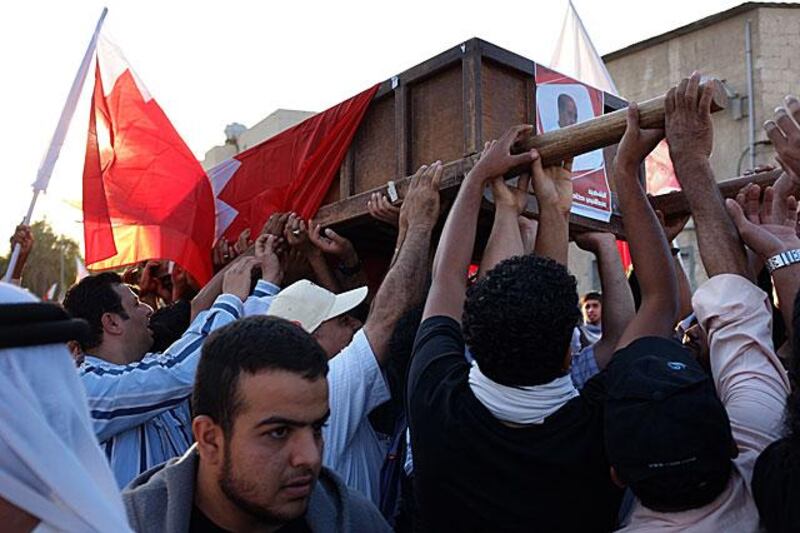MANAMA // Bahraini security forces broke up a march following a funeral procession in the Shiite village of Aali yesterday, a day after the release of the Bahrain Independent Commission of Inquiry's (BICI) report.
The document detailed the scale of the human-rights abuses that have taken place in the kingdom since demonstrations began in February and the subsequent government crackdown.
The inquiry, which was authorised and paid for by King Hamad bin Isa Al Khalifa, presented an unvarnished account of the government's response to the protests and found that systematic ill-treatment, had taken place.
Al Wefaq, the country's main opposition party, yesterday called for the removal of the current government, saying that it was only right for the cabinet to be fired or for it to step down given the scale of the violations detailed in the commission's report.
"After listening to the violations committed through its departments, the government should have resigned as a true gesture to the people," said Khalil Al Marzooq, a former MP and member of Al Wefaq, at the group's headquarters yesterday.
Mr Al Marzooq said while his bloc welcomed the frankness of the report, they did not feel the recommendations went far enough.
"There were many good things in the report that were not matched by good recommendations," he said.
"But, we will utilise the report in the best capacity and build on raising awareness of the violations, which are caused by the absence of democracy."
Al Wefaq has also prepared a shadow report on rights violations, with officials indicating that it would be released in the coming days. Among the findings outlined in the almost 500-page BICI report was that the commission - led by five non-Bahraini legal scholars - had not been able to link the uprising in Bahrain to the Iranian regime, as authorities had alleged.
Yesterday, the official Bahrain News Agency suggested that the government possessed evidence of Iranian involvement, saying that national security concerns had prevented classified intelligence on Iran from being shared.
Meanwhile, the White House issued a statement late on Wednesday describing the BICI report as a "thorough and independent assessment" of the recent turmoil in Bahrain.
"King Hamad's decision to establish the commission was a courageous one, and we commend him for it," the White House press secretary said.
"The report identifies a number of disturbing human-rights abuses that took place during this period, and it is now incumbent upon the government of Bahrain to hold accountable those responsible for human-rights violations and put in place institutional changes to ensure that such abuses do not happen again."
William Hague, the British foreign secretary, also described some of the findings in the report as "worrying" and called on the government and the opposition to implement the inquiry's recommendations.
"Some of the Commission's findings are deeply worrying, in particular the use of systematic torture and excessive force against detainees," Mr Hague said.
"The world will be watching to ensure that [Bahrain] acts decisively in the coming days and weeks to address the serious abuses identified. This will be crucial to Bahrain's future stability."
During the clashes in Aali yesterday, many people took shelter in nearby homes, as armed riot police, using tear-gas and sound grenades, stormed the village after the burial of Abdul Nabi Qadem - a 47-year-old man killed in disputed circumstances on Wednesday.
A smaller group of protesters threw rocks at police and set up makeshift road blocks before security forces in Jeeps and dozens on foot moved further into the village.
The interior ministry said in a statement released via Twitter that a group of about 500 people had held an "illegal rally" after the funeral had taken place. Police were attacked with Molotov cocktails and rocks, the ministry said, prompting them to move in.
Taking shelter in a nearby home after security forces opened fire on the funeral march, some of the dead man's relatives said the family was convinced he was killed when two police cars rammed into his vehicle on purpose.
Authorities have claimed that Qadem died from injuries sustained after he lost control of his car and smashed into a wall and another vehicle.
"He was a very peaceful person," said a male relative in his 40s.
[ zconstantine@thenational.ae ]
* With additional reporting by the Associated Press





